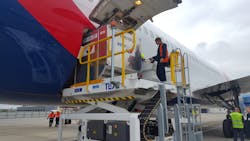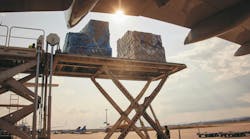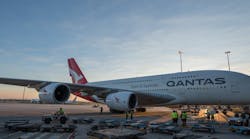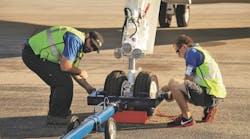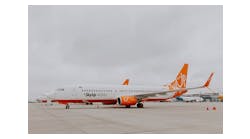The Russian government is considering introducing a package of measures, aimed at de-monopolizing its domestic ground handling industry and improving the quality of provided services by local operators.
Implementation of these plans will be carried out within the existing Rules for Access to Services of Natural Monopolies at Russian Airports, which were approved by the Russian government as far back as 2009 and which created conditions for the stimulation of competition in the domestic industry of ground handling.
According to Anatoly Golomolzin, deputy head of the Russian Federal Anti-Monopoly Service (FAS), since that time, a package of amendments to the new rules has been taken.
The rules have set, on a mandatory basis, the presence of no less than two ground handling operators at domestic airports with passenger traffic of at least 1 million passengers per year, and at least three organizations at airports with a passenger traffic of more than 5 million passengers per year. Still, implementation of the rules in practice is often associated with serious difficulties.
According to Golomolzin, the adoption of these rules resulted in a significant improvement in the situation and tightening of competition in this market.
At the same time, despite the optimism of the FAS, the majority of industry analysts believe that the current situation in the industry remains complex.
A Lack of Independent Companies
Despite all the efforts, which have been taken by the Russian government, the country’s ground handling industry remains highly monopolized. This is reflected by the lack of independent companies specializing on the provision of services in the field of ground handling in the country.
As in the past, currently such services are still provided by the companies affiliated with airports, which can result in high prices and low quality.
Currently almost half of the costs of airlines, paid by airlines in airports, account for ground handling services as well as fuel. Despite certain state initiatives, which have been implemented in recent years, the Russian aviation market is still reluctant to move towards de-monopolization of the segment of ground handling.
At the same time, the situation is even more complex in the case of regional airports. According to analysts of the Russian Ministry of Transport, ground handling services in the majority of Russian provincial airports remain in a state of monopoly.
In order to improve the current situation, the Russian government is considering creating conditions for the increase in the number of handling and refueling companies operating at domestic airports.
According to state plans, this should additionally attract at least three to four ground service providers and three fueling companies in each Russian airport and significantly reduce prices for their services.
Today the cost of ground handling services in the majority of Russian airports is estimated at $7-10 (USD) per passenger. At the same time prices for aviation fuel are usually higher than in the majority of the EU airports and in North America.
At the same time, according to plans of the Russian Ministry of Transport, the attraction of one or two additional service providers to local airports should help to reduce prices for ground handling services to $5-6 per passenger. This, in turn, could help to attract new airlines to airports and increase revenue of ground handling operators.
Sharing Costs
In order to attract new airlines, some airports, to date, have even decided to bear part of carriers' costs for ground handling. The government also plans to create conditions for the liberalization of the fuel market to help airlines further reduce their costs during the launch of new destinations.
Implementation of these plans will be personally controlled by Maxim Sokolov, Russia’s Minister of Transport as well as the FAS.
“Today, small and even bigger Russian airports are actually in a closed circle. Airlines do not open new destinations due to high prices for ground handling and small passenger traffic, while service providers do not come to airports, due to a limited number of airlines, based in it,” says Sokolov. “In order to solve this problem, a tripartite agreement between the airport, the airline and the handling provider should be signed during the launch of a new route. This will make it possible to reduce the cost of launching of a new route for the airline, to provide regular utilization to a ground handling provider, while in the case of airports, to help them to increase their passenger flows.”
Equipment Updates
Last year the majority of Russian airports were able to successfully complete the procedure of technical re-equipment, which was initiated by the Russian government and resulted in equipping their ground support equipment (GSE) with ignition interlock devices – a mechanism that prevents the engine from being started in the case of blood alcohol concentration of the driver, as well as global positioning system (GPS) and global navigation satellite system (GLONASS) technology.
In the case of GPS and GLONASS, the new systems were installed in all vehicles in national airports, including cars of technical services and buses, as well as snow-removal machines and fire engines.
In addition, the majority of Russian airports have completed installation of roadway scanning systems, which allow dispatchers to control all the movements on or near the landing field in poor visability conditions. Finally, most of Russian airports received additional multilateration systems and a new generation of radio detectors.
Government Efforts
Russia’s government also has established a single center of control for ground handling resources in each of the country’s airports. According to analysts of the Russian Ministry of Transport, implementation of the latest measure is very important, as the current lack of such a service sometimes results in the inability of dispatchers to make decisions regarding with the priority of flights’ service.
In addition to technical modernization, the Russian government has significantly toughened requirements for the training of personnel of local ground handling companies and made the profession more prestigious through the rise of salaries to the industry’s workers and the introduction of minimum wages for them.
This year the Russian Ministry of Transport plans to complete the introduction of a new modern system of information management in all Russian airports and computerize all the operations of ground handling.
According to Alexei Rayevsky, deputy director of commerce of Moscow-based Domodedovo Airport – Russia’s second largest airport, in recent years the quality of ground handling services provided at domestic airports has significantly increased. This is also due to successful implementation of state initiatives last year and the increase of competition in the market. However, the problem still exist.
In the case of Domodedovo, the airport plans to introduce the European scheme of the provision of ground handling services. That will involve establishing equal conditions of the access to ground handling services to all airlines operating in the airport to further stimulate competition in this field.
According to Raevsky, Domodedovo and other Russian airports plans to use the experience of the European airports in the field of de-monopolization of ground handling services. According to him, for the last five years, prices for ground handling services at the EU airports have declined by more than 12 percent.
At the same time the number of third-party operators in the apron segment almost doubled, while in baggage handling segment these figures have grown by more than 50 percent. Raevsky said that the achievement of these results are mainly due to successful reforms that were conducted by the European aviation regulators in the ground handling field.
At the same time, according to Sokolov, numerous studies conducted by analysts of the Russian Ministry of Transport have shown that the provision of ground handling services by the airport itself, and the companies affiliated with it, leads to unreasonably high prices for these services, which results in the growth of ticket prices, due to the need of airlines to compensate these costs.
However, according to Sokolov, the introduction of more strict control in the Russian market of ground handling services and its further de-monopolization should help to solve these problems by as early as next year, and in particular prior to World Cup 2018, that will be organized in Russia.
